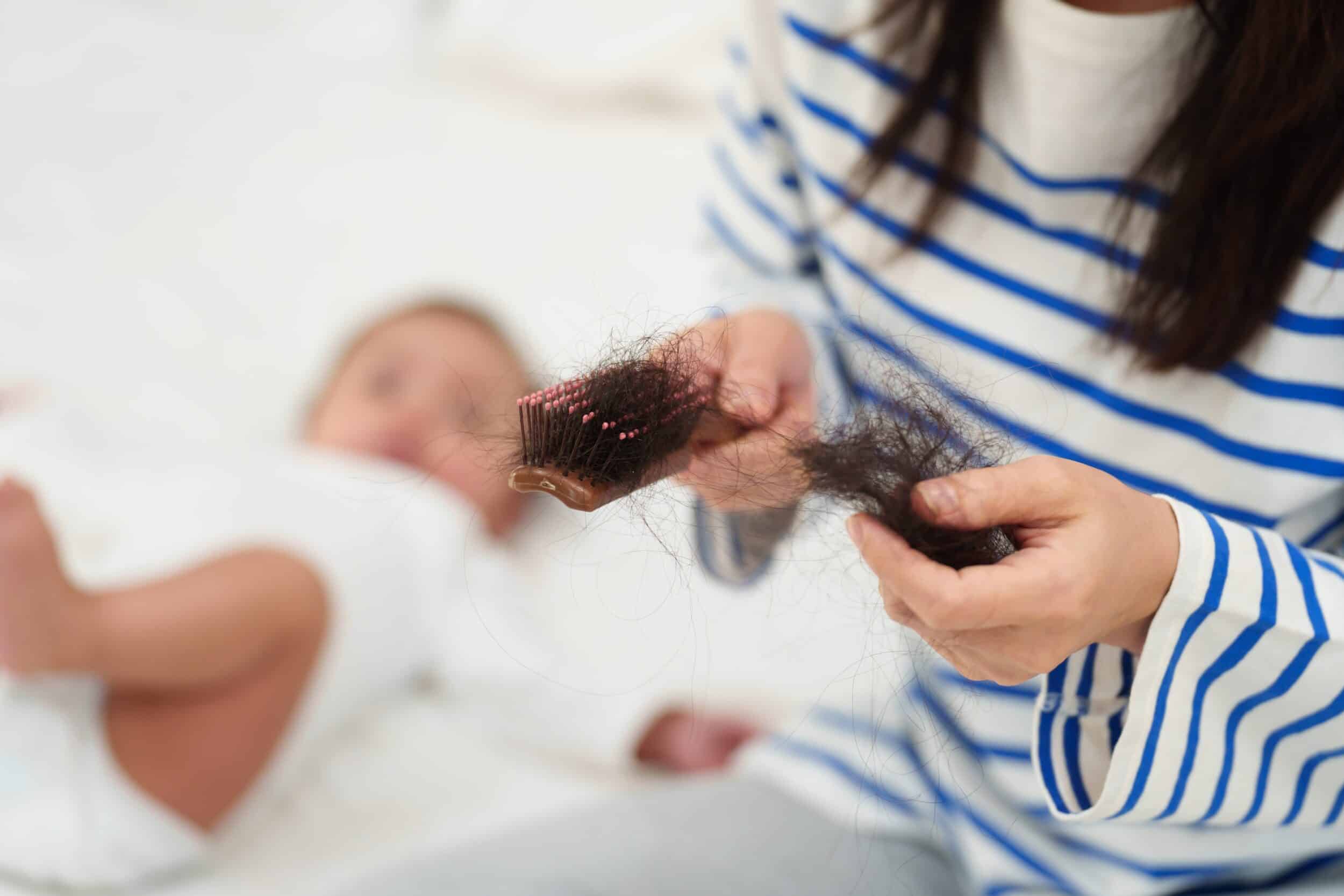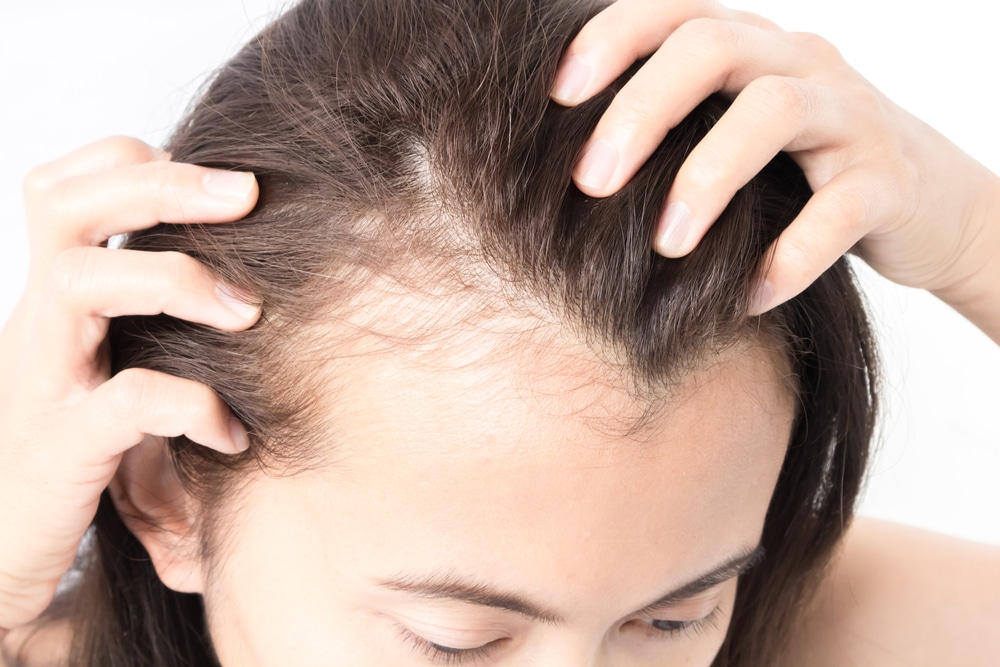You’ve welcomed your new baby into your family and you’re starting to feel like yourself again. You may be settling into your new routine and even getting some quality sleep. So, why, while you’re regaining your footing, are you shedding hair at an alarming rate? This is a question many new mamas ask. Post-partum hair loss is more common than you may imagine, and, while there are ways to manage this phenomenon, you should also know when and how to treat it.

West End Hair Restoration, a branch of West End Plastic Surgery has been established on a strong reputation of reliability and artistry. Patients in the area of Washington D.C. can rediscover their greatest sense of confidence through our comprehensive hair restoration treatments. We’re here to help you! To learn more about our post-partum hair loss treatment, contact Dr. Lexi Wang at 202-785-4187.
What is Postpartum Hair Loss?
Hair loss in new moms is a condition of excessive shedding. It usually occurs three to five months after a woman gives birth, after most other postpartum symptoms have resolved. Due to its timing, postpartum hair loss often comes as an unwelcome surprise.
How Common Is Postpartum Hair Loss?
If you or someone you love is experiencing postpartum hair loss, it may help to know that this condition is very common. Approximately half of all new moms experience this problem.
What Are The Causes Of Postpartum Hair Loss?
As you may know, your hair grows in cycles. At one time, it is growing. At another, it is resting. Still, at another, your hair sheds. During pregnancy, the changes in your hormones cause your hair to be in an extended growth phase. This is why you may have enjoyed robust hair growth for several months before giving birth. After delivery, however, your hormones naturally engage in another state of flux. Specifically, your levels of estrogen decline sharply. This leads to a shedding phase that is more profound than normal, resulting in the loss of a large volume of hair.
Is Postpartum Hair Loss Preventable?
Postpartum hair loss is solely related to your shifting hormones so is not preventable. That said, there may be a few strategies you can employ to ease your shedding. These include:
- Be gentle with your hair and scalp during this temporary phase. Brush daily using a softer-bristled brush and a soft hand that doesn’t place too much traction on hair follicles.
- Sleep on a silk pillowcase. Doing so places less “pull” on your hair while you sleep.
- Eat well! Your nutrition can affect your hormones and your overall health while you are in the state of postpartum transition. Caring for yourself and your newborn takes extra energy, so load up on lean proteins, healthy fats, and lots of fresh fruits and vegetables.
- Supplement. There are many reasons a new mama may not be able to get the nutrients that she needs from her daily diet. When necessary, it can be beneficial to take a postpartum health supplement like a special multivitamin. This is quick, easy, and effective.
Read what our patients are saying!
"The entire staff at West End Plastic Surgery should be commended for the professionalism, care, and outstanding service they provide. I am most pleased with the results of my procedure and highly recommend them."
Click here to read more reviews.

How To Treat Postpartum Hair Loss
Often, postpartum hair loss does not require treatment. The condition is usually temporary, and, using the tips for nutrition and hair care, may be manageable. Some women don a new hairdo for a short time to increase the appearance of fullness until their hair growth cycle regulates naturally. In some instances, though, this doesn’t happen. That’s when you can consult with hair loss experts.
At West End Hair Restoration, our experienced physicians help people every day who want to enjoy the fullness and thickness they once had. Using cutting-edge NeoGraft technology, we continually achieve remarkable results. NeoGraft is a proven treatment for postpartum hair loss that requires very little downtime for recovery, but offers rewarding outcomes!
Postpartum Hair Loss and Scalp Care
Scalp sensitivity is common after childbirth, so taking care of your scalp can help minimize hair loss and promote healthier regrowth. Our team recommends that you:
- Use a gentle, sulfate-free shampoo to cleanse your scalp. This will help prevent the buildup of oils and products, which can clog hair follicles and impede growth.
- Limit heavy styling products such as hairsprays, gels, and other products that contain harsh chemicals. These can lead to scalp irritation and further stress the hair follicles.
- Maintain a well-hydrated scalp to protect the health of your hair follicles. Drinking plenty of water will help keep your scalp hydrated from the inside out.
- Regularly massage your scalp to increase blood flow to the area, further promoting hair growth. Use your fingers' pads to gently massage your scalp in circular motions. Consider using a light, nourishing oil like coconut or argan oil to enhance the massage and moisturize the scalp.
- Opt for scrunchies with soft fabrics rather than elastic bands that can pull on your hair and cause breakage. Also, avoid tight hairstyles that strain the scalp.
When Does Postpartum Hair Loss Start and Stop?
Hair loss after giving birth usually starts around three months after childbirth. This timing can differ based on individual hormonal changes. The shedding phase is typically noticeable when you brush or wash your hair, with increased hair strands coming out. The hair loss usually peaks around the fourth or fifth month postpartum and gradually slows down, with most women seeing cessation of excessive shedding by the time their baby reaches their first birthday.

Can Postpartum Hair Loss Affect My Entire Head or Just Specific Areas?
Postpartum hair loss typically occurs evenly across the scalp, but some women may notice more significant thinning around the temples and forehead. This pattern can vary greatly from one individual to another.
Does Breastfeeding Influence Postpartum Hair Loss?
Breastfeeding itself does not cause postpartum hair loss. The hair loss experienced after childbirth is primarily due to hormonal changes. However, prolonged breastfeeding can delay the normalization of your hormonal levels, potentially extending the period of hair loss slightly for some women.
How Long Does Postpartum Hair Loss Last?
Post-pregnancy hair loss typically begins a few months after childbirth and lasts about 3 to 6 months. It is important to note that the duration can vary from person to person. Some mothers may experience shedding for a shorter period, while others might notice it continues slightly longer. Generally, the hair cycle returns to normal within a year after delivery.
When Should I See a Doctor About Postpartum Alopecia in Washington, D.C., Maryland, and Northern Virginia?
You may decide to consult a hair restoration professional if:
- Your hair loss is severe, causing bald patches.
- Your hair loss continues well beyond the typical one-year postpartum period.
- You notice other symptoms, such as skin changes on the scalp or an overall thinning that doesn’t seem to recover.
These could be signs of an underlying condition that requires attention.
We would love to help you reclaim your pre-pregnancy hair growth. To learn more about the NeoGraft hair restoration process, contact our Washington D.C. office at 202-785-4187 today for a consultation with Dr. Lexie Wang.
FAQs
What Causes Hair Loss After Pregnancy?
Postpartum hair loss is primarily caused by hormonal changes during and after pregnancy. During pregnancy, elevated levels of estrogen prolong the hair’s growth phase (anagen phase), resulting in thicker, fuller hair for many women. After childbirth, estrogen levels drop sharply, causing more hair than usual to enter the shedding phase (telogen phase). This leads to noticeable hair loss, typically around the scalp’s crown and hairline.
When Does Postpartum Hair Loss Start?
Postpartum hair loss usually begins around three to four months after giving birth. This timing corresponds with the natural cycle of hair growth and shedding, as the hair follicles adjust to the hormonal shifts. While the onset and severity vary among individuals, most women notice increased shedding by the time their baby is three months old. It’s essential to understand that this process is temporary and generally resolves on its own within six to twelve months postpartum.
How Much Postpartum Hair Loss is Normal?
It’s normal to lose up to 100 hairs a day, but postpartum hair loss can increase shedding to 300 hairs or more daily. This can seem alarming, especially when hair is found in clumps on pillows, in the shower, or on brushes. Despite the increased shedding, postpartum hair loss rarely results in permanent bald spots. If you’re losing excessive amounts of hair or notice patches of thinning that don’t improve after a year, it’s a good idea to consult a specialist for further evaluation.
Does Hair Loss After Birth Worsen With Subsequent Pregnancies?
Postpartum hair loss can occur with each pregnancy, but its severity may vary depending on individual hormonal changes, stress levels, and overall health. While some women may experience more pronounced hair loss after a second or third pregnancy, others may find it less noticeable. Factors such as age, nutrition, and how the body’s hormones rebound postpartum can influence the degree of hair shedding. If you have concerns, speaking with a hair restoration specialist can provide personalized advice and solutions.
Can Anything Be Done to Manage Postpartum Hair Loss?
Although postpartum hair loss is a natural process, there are steps you can take to promote healthy hair growth and minimize shedding:
- Maintain a Balanced Diet: Ensure you’re consuming enough vitamins and nutrients, particularly biotin, iron, and zinc, to support hair health.
- Gentle Hair Care: Avoid harsh treatments like excessive heat styling, tight hairstyles, or chemical products that can weaken hair strands.
- Choose Volumizing Products: Use shampoos and conditioners designed to add volume and thickness to your hair.
- Scalp Massage: Regular scalp massages with oils like coconut or argan oil can stimulate blood flow to hair follicles.
- Seek Professional Guidance: If postpartum hair loss persists or worsens, a consultation with one of our hair restoration experts can help identify underlying issues and provide targeted treatments.
When Should I Consult a Specialist?
If postpartum hair loss extends beyond a year or you notice significant thinning or bald patches, it may indicate an underlying condition like alopecia or thyroid dysfunction. At West End Hair Restoration Center, our specialists are equipped to evaluate and address postpartum hair concerns, offering customized solutions tailored to your needs.
